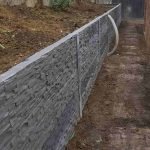Introduction: The Significance of Keeping Walls
Retaining walls are more than just structural components; they are vital for managing soil erosion, creating usable terraced areas, and enhancing landscape aesthetic appeals. As the demand for competent professionals increases, understanding the essential abilities needed to master this field becomes critical. In this comprehensive guide, we will explore Essential Skills Every Top-Tier Retaining Wall Contractor Must Have From technical knowledge to task management expertise, we'll explore the breadth of competencies that define a competent retaining wall installer.
Essential Abilities Every Top-Tier Retaining Wall Contractor Should Have
Understanding Soil Mechanics
Soil mechanics is foundational for any retaining wall contractor. The capability to examine soil types-- whether clayey, sandy, or fertile-- enables contractors to select the best products and design structures that can stand up to lateral earth pressures.

- Key Concepts: Soil Types: Understanding different soil characteristics. Load Circulation: How loads move through walls. Shear Strength: Recognizing possible failure points.
Material Knowledge
A top-tier retaining wall builder should be well-versed in different materials readily available for building. This consists of:
- Concrete Sleepers: Resilient and versatile options. H Beams: For heavy-duty applications. Wood Sleepers: Visual appeal with natural materials. Timber Sleepers: Typical in property projects. Stone: Includes rustic charm however requires know-how in placement.
Design Principles
Contractors need a solid grasp of style concepts, consisting of:
Hydraulic Design: Managing water circulation to avoid disintegration and damage. Geometric Style: Ensuring the wall fits within the landscape visually and functionally. Safety Factors: Incorporating safety margins in designs.Project Management Skills
Managing a keeping wall task includes collaborating numerous jobs:
- Budgeting Scheduling Resource Allocation
Effective job management guarantees prompt completion and adherence to security standards.
Technical Illustration Proficiency
The ability to read and develop technical illustrations is essential:
- Understanding blueprints is essential for effective implementation. Creating detailed schematics allows for much better communication with clients and workers.
Knowledge of Local Regulations
Every location has its own building regulations and guidelines. An experienced contractor ought to be:
- Familiar with zoning laws. Able to secure required permits.
Problem-Solving Capabilities
Unexpected challenges emerge frequently on task websites. A capable professional must demonstrate strong analytical skills, such as:
Adjusting strategies based upon unforeseen site conditions. Finding imaginative solutions within budget constraints.Physical Fitness
Building retaining walls can be physically demanding work needing strength and endurance for tasks like lifting heavy stones or mixing concrete.

Customer Service Skills
Building relationship with clients is important for repeat company. Contractors must sharpen their customer service skills by:
- Communicating successfully about timelines and expectations. Being responsive to customer concerns during projects.
Team Leadership
As a professional, leading a group efficiently is important for guaranteeing that everyone works harmoniously towards common goals.
Table of Essential Skills
|Ability|Description|| -----------------------|-----------------------------------------------------|| Soil Mechanics|Comprehending soil behavior under load|| Material Knowledge|Familiarity with numerous wall-building products|| Design Concepts|Capability to use engineering design ideas|| Task Management|Supervising budget plans, timelines, and resources|| Technical Drawing|Reading plans and developing schematics|| Regional Laws|Knowledge of building codes pertinent to projects|| Problem-Solving|Adjusting strategies based upon site-specific challenges|| Physical conditioning|Strength required for physical labor|| Client service|Structure relationships with customers|| Team Management|Guiding team members towards project completion|
Attention to Detail
Small oversights can cause substantial issues down the line. A careful eye makes sure that http://johnathanlmem242.bearsfanteamshop.com/the-necessary-guide-to-hiring-a-retaining-wall-contractor every element-- from measurements to finishes-- is carried out flawlessly.
Safety Awareness
Prioritizing security secures both employees and customers alike. Professionals ought to be well-acquainted with security procedures appropriate to building and construction sites.
Adaptability
Construction environments are dynamic; thus versatility is key:
Being open up to changing techniques based on new information or technology. Adjusting work practices according to climate condition or client feedback.Frequently Asked Concerns (Frequently asked questions)
1. What sort of training do keeping wall professionals need?
Training frequently includes vocational education in building and construction management or civil engineering, along with hands-on experience through apprenticeships or working along with experienced professionals.
2. What materials are best for building retaining walls?
The best material differs by application; however, concrete sleepers are popular due to durability, while stone uses aesthetic appeal but requires experienced setup techniques.
3. Can I construct a keeping wall myself?
While DIY projects are possible, without appropriate knowledge of soil mechanics and material residential or commercial properties, problems may emerge that might impact stability or aesthetics over time.
4. How do I choose the ideal contractor?
Look for experience in similar tasks, positive reviews from previous customers, and clear interaction relating to timelines and budgets before making your decision.
5. Are there particular permits required for constructing a maintaining wall?
Yes! Many municipalities require authorizations depending upon height or place near home lines; it's necessary to check regional guidelines before commencing any work.
6. The length of time does it typically take to set up a retaining wall?
Installation time varies greatly depending upon size and complexity however generally varies from a number of days approximately weeks when considering all required preparations (like excavation).
Conclusion: Structure Success One Wall at a Time
In summary, mastering the vital skills every top-tier retaining wall contractor must have not just improves private professionalism however likewise contributes considerably to market requirements as a whole. By honing these abilities-- ranging from technical efficiency in product choice all the way through exceptional customer service-- professionals can ensure their location as relied on experts within their neighborhoods while providing sensational results that stand the test of time!
This article works as a substantial resource describing what it genuinely requires to be successful as a leading figure among retaining wall contractors today! Whether you're looking into employing somebody or aspiring yourself towards turning into one-- comprehending these skills will assist set you off on strong footing right from the start!
